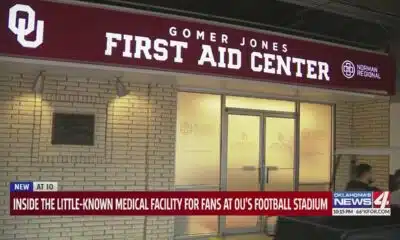News from the South - North Carolina News Feed
AdventHealth makes its most public case for building region’s second-largest hospital, but has yet to ask the state for permission
Months before it can get official permission from the state, Florida-based nonprofit AdventHealth is seeking public support for a 129-bed expansion of its already approved 93-bed new hospital under construction in northern Buncombe County.
Coupled with an earlier, pending certificate of need (CON) request to the state for 26 additional beds, AdventHealth will be proposing a total of 222 acute care beds for the new facility in Weaverville, making it — if approved by state regulators, and if it withstands possible challenges from Nashville-based for-profit HCA Healthcare — the second-largest hospital in western North Carolina and the first major competitor to HCA Mission Health’s near-monopoly on hospital services in Buncombe County.
Mission Hospital in Asheville has 682 licensed acute-care beds. UNC Health Pardee in Henderson County has 201. The Charles George VA Medical Center in Buncombe County has 119. AdventHealth already operates a 62-bed hospital in Henderson County, according to the Proposed 2026 State Medical Facilities Plan.

For months, AdventHealth, a Seventh-day Adventist nonprofit that is the largest Christian-based nonprofit hospital system in the United States, quietly has been pitching a proposal for the additional 129 beds to local leaders across the region. But this week’s public announcement of plans marks the first significant indication of AdventHealth’s vision for a much larger facility.
The announcement, however, comes months before any possible official action.
Applications for the additional 129 beds cannot be submitted to the state until Oct. 15, according to the 2025 State Medical Facilities Plan. AdventHealth, which owns more than 50 hospitals across the nation, has been gathering letters of support from town councils, health departments and residents in preparation for its application.
It’s already started grading work at the 30-plus acre site and is planning a groundbreaking ceremony later this year. When AdventHealth first applied for the project, the nonprofit told the North Carolina Department of Health and Human Services’ Division of Health Service Regulation (DHSR) it would cost $254 million. Plans to expand the hospital will inflate the price, AdventHealth spokesperson Victoria Dunkle said.
“We will be sharing the updated scope, scale and costs in the final application,” she said.
Though AdventHealth originally said the hospital would open by 2027, expansion and a complex application process make that aspiration unlikely.
Weaverville Mayor Patrick Fitzsimmons said that although the delays are frustrating, the prospect of a large new hospital is welcome in this town of about 4,500.
“This is a positive development for our town,” Fitzsimmons said. “We’re talking about the addition of maybe as many as a couple thousand jobs as these new hospital beds are allotted, the kind we’re trying to attract to Weaverville.”
Service area: Buncombe, Graham, Madison and Yancey
Meant to serve patients in Buncombe, Graham, Madison and Yancey counties, the facility originally was slated for only 67 beds, according to the certificate of need application AdventHealth filed in 2022, which was approved by the state months later, despite competition and opposition from other big health care systems, including the HCA Healthcare-owned Mission Health system.
North Carolina’s CON law forces medical facilities to compete when they want to expand, add services, or buy expensive equipment. Organizations apply for projects and the state decides whether they are necessary.
In 2024 Advent added an application for 26 more beds to its original bid, bringing the total it was asking to 93. The extra 129 beds proposed this week would more than double the total bed count at the proposed Weaverville hospital.
“With 222 beds, the community will have more access to higher-level emergency and specialty care and more choices for how and where to receive this advanced care,” the release said, touting “not-for-profit, whole-person care” and “the growing needs of our region.”

Though a thumbs-up from the DHSR, the entity responsible for approving applications, is the first step to getting those beds, it’s hardly the last. CON law allows other hospitals to appeal the DHSR decision repeatedly, which Mission Health has done with all of AdventHealth’s previous approvals for the hospital. Last month an appellate court judge ruled against HCA-Mission’s most recent challenge to the 67-bed bid, which the DHSR approved more than three years ago.
Mission Health spokesperson Katie Czerwinski declined comment on Mission’s appeals. She did not respond to a question about whether Mission would also apply for the 129 beds come October.
HCA also challenges 26-bed AdventHealth award
AdventHealth’s announcement Monday highlighted the North Carolina Court of Appeals decision to finally greenlight the 67 beds, opposing Mission Health’s contention since 2022 that it didn’t get a fair shake in the CON process. Both Mission and Novant Health tried to win the beds that year.
“AdventHealth is grateful for the North Carolina Court of Appeals’ decision to uphold the State’s approval of our CON application for a 67-bed hospital in Buncombe County,” the news release said.
Because of CON laws and Mission’s legal contentions, AdventHealth is far from clear to finalize its vision of opening what would be one of the region’s largest hospitals by acute-care-bed count. Although the battle over the 67 beds is over now, another one is waiting on an Office of Administrative Hearings judge’s decision. Mission Health filed an appeal Dec. 20, 2024, stating that AdventHealth’s 26-bed application was erroneously granted to AdventHealth.
“By denying Mission a CON for the Mission Application, the Agency’s Decision prevents Mission from expanding Mission Hospital to meet the needs of Mission’s existing and future patients and therefore directly limits Mission’s ability to engage in its lawful business,” the appeal said.
AdventHealth did not mention the 26 beds in its release.
“The 26-bed approval is currently under appeal by a competitor,” AdventHealth spokesperson Victoria Dunkle said Tuesday. “That appeal is being reviewed through the Office of Administrative Hearings. Despite this delay, we remain steadfast in our commitment to bring these 93 beds — and the whole-person care they represent — to the people of Western North Carolina. We are confident that the State’s original decision will be upheld, and we continue to prepare to deliver on that promise.”
An effort to repeal CON laws, Senate Bill 370, made headway in the General Assembly this April. But that effort may be overshadowed by a 2020 lawsuit brought by a New Bern vision physician, Jay Singleton, in the state’s Supreme Court, arguing the multilayered application process “has nothing to do with protecting the health or safety of real patients.”
Currently, 34 other states have similar CON laws.
“Proponents of CON laws contend that if excess health care service capacity exists, price inflation may occur to compensate for new, underused health care services or empty beds,” according to a summary by the National Conference of State Legislators. “Opponents believe CON laws stifle competition by protecting incumbent providers and creating a burdensome approval process for establishing new facilities and services.”
Asheville Watchdog welcomes thoughtful reader comments on this story, which has been republished on our Facebook page. Please submit your comments there.
Asheville Watchdog is a nonprofit news team producing stories that matter to Asheville and Buncombe County. Andrew R. Jones is a Watchdog investigative reporter. Email arjones@avlwatchdog.org. The Watchdog’s local reporting is made possible by donations from the community. To show your support for this vital public service go to avlwatchdog.org/support-our-publication/.
Related
The post AdventHealth makes its most public case for building region’s second-largest hospital, but has yet to ask the state for permission appeared first on avlwatchdog.org
Note: The following A.I. based commentary is not part of the original article, reproduced above, but is offered in the hopes that it will promote greater media literacy and critical thinking, by making any potential bias more visible to the reader –Staff Editor.
Political Bias Rating: Centrist
This content offers a straightforward, fact-based report on AdventHealth’s hospital expansion plans and the surrounding regulatory and legal environment. It primarily focuses on healthcare infrastructure development, regulatory processes, and competition dynamics without expressing partisan opinions or ideological viewpoints. The article presents multiple perspectives, including that of AdventHealth, its competitors, local officials, and regulatory authorities, maintaining an objective tone typical of centrist reporting.
News from the South - North Carolina News Feed
Frank Porter Graham and the legacy of Social Security
SUMMARY: Ninety years ago, the U.S. Congress passed the Social Security Act, establishing federal old-age benefits and support for vulnerable populations. Frank Porter Graham, former UNC president and brief U.S. senator from North Carolina, played a crucial role in its creation, chairing the Advisory Council on Economic Security under FDR. Graham championed racial equality, labor rights, and economic justice, viewing economic security as a moral imperative essential to American liberty. Despite compromises in the law’s final form, his vision laid a foundation for social progress. His legacy encourages renewed commitment to social justice amid present challenges, highlighting North Carolina’s tradition of humane progress.
The post Frank Porter Graham and the legacy of Social Security appeared first on ncnewsline.com
News from the South - North Carolina News Feed
Flesh-eating screwworm parasite confirmed in US
SUMMARY: The flesh-eating New World screwworm parasite, which feeds on living flesh of warm-blooded animals, has been confirmed in the US for the first time in a human case in Maryland, involving a traveler from El Salvador. This parasite causes severe infections as larvae burrow into wounds, posing a major threat to livestock and wildlife. While no cases have been reported in Texas, concerns persist due to infections in Mexico, including human deaths. Texas officials are working to control the parasite using fly bait and sterile flies from Panama to prevent reproduction and stop its spread, aiming to protect both animals and humans.
The first human case of the flesh-eating screwworm parasite has been confirmed in the U.S. Federal health officials say the risk to the public is low but concerns are growing in Texas, where the agriculture community is already on alert.
WRAL App: https://www.wral.com/download-wral-apps/5787234/
The Latest Weather: https://www.wral.com/weather/page/1010362/
News Tips:
Online – https://www.wral.com/report-it/
Email – assignmentdesk@wral.com
Subscribe to WRAL:
https://youtube.com/c/wral5
Follow WRAL:
Facebook: https://facebook.com/WRALTV
X: https://twitter.com/WRAL
IG: https://instagram.com/wral
About WRAL-TV:
WRAL is your Raleigh, North Carolina news source. Check out our videos for the latest news in Raleigh, local sports, Raleigh weather, and more at https://WRAL.com
#localnews #northcarolina
News from the South - North Carolina News Feed
Omnibus elections bill still simmering in NC legislature
You Can Vote executive director Kate Fellman breathed a sigh of relief when a bill effectively banning voter registration drives died earlier this legislative session after bipartisan pushback. But now, one of a multitude of provisions in the latest version of this year’s elections omnibus bill would do the same thing, albeit in a different way.
The omnibus bill would require registrants to provide their full Social Security number on their voter applications. Under current law, applicants have an option between giving the last four digits of their Social Security number or their North Carolina driver’s license number.
This session’s elections bill began as a “correction to the rush job” the legislature passed last year after the elections, Senate Bill 382, said Mark Swallow, an advocate for left-leaning Democracy Out Loud. Last year’s bill tightened ballot counting and curing deadlines, amongst other election changes, while this year’s bill loosens them a bit.
[Subscribe for FREE to Carolina Public Press’ alerts and weekend roundup newsletters]
However, as the session progressed, it quickly became a grab bag for the Republican majority’s election priorities.
While much of the legislature’s policy work is paused until next year, the elections omnibus is on a different timeline. It may see movement as early as September, according to bill sponsor Rep. Hugh Blackwell, R-Burke.
In Swallow’s view, it’s come a long way, but still has a ways to go.
And in an increasingly uncommon move in North Carolina’s GOP-led legislature, Blackwell is taking in everyone’s feedback on the omnibus before moving forward.
Social Security number, please
Fellman does a lot of voter registration as part of You Can Vote, a civic organization focused on voter education and empowerment.
She already hears concerns about the security of providing the last four digits of registrants’ Social Security numbers. Some of the younger registrants don’t know their number offhand, and have to call or text their parents to get the information, which raises further security issues, she added.
“Nobody would give (their full SSN) to a stranger just out on the street,” Fellman said. “… I just don’t know how you could actually do paper voter registration form collection.”
Jim Womack, president of the conservative North Carolina Election Integrity Team, said having a full Social Security number, as the omnibus would require, would make list maintenance easier, as the only true unique data point among voter registrants.
NCEIT is a chapter of the Election Integrity Network, founded by former Trump lawyer Cleta Mitchell. Mitchell helped Trump in his failed bid to overturn the 2020 election. Now Rep. Pricey Harrison, D-Guilford, and several others think North Carolina lawmakers are following her election policy playbook.
Womack, for his part, said providing a full Social Security number is no more dangerous than providing any other information at a voter registration drive.
“If it’s the full Social, they’ve got to protect it the same way they do the last four (of the SSN) or the driver’s license number, because both of those are protected as well,” he said. “So I mean, there’s always risk in allowing voter registration drives.”
‘How it should be’
At a late June House Election Law committee meeting, Harrison posed a concern to Blackwell about a provision of the omnibus bill that would have barred boards of election from “encouraging or promoting voter turnout in any election.”
The provision seemed “a bit vague” to her. Didn’t they want the county boards to encourage turnout? Wasn’t part of their job to promote voting?
Blackwell assured Harrison that there was more work to do on the bill before it was ready for a vote.
“The idea is that we want the State Board to focus on the conduct of the election, and that the responsibility for turnout is better handled by other folks,” he said. “We were trying to draw a line, and we may not have gotten it just at the sweet spot.”
The next time the omnibus bill was heard in committee, the turnout provision was axed. And instead of moving straight from the elections committee to rules, where the bill would have likely been expedited to a floor vote, the bill was assigned an additional committee hearing.
After that committee meeting, where Harrison raised other concerns, Blackwell’s staff emailed her to ask further questions. While Harrison still has a list of issues with the omnibus bill, she gave credit to Blackwell for being amenable to changes, and giving the bill time to improve.
“I’d rather them do it out in the open, in a committee, than to go into a back room and figure out what’s going to work,” she said. “This is actually a better, more public process. This is how it should be.”
The omnibus bill has undergone a number of other changes since its debut.
Instead of offering State Board of Elections Executive Director Sam Hayes the ability to make 25 political hires — which he said were needed to ensure “ the folks that are surrounding me, certainly my direct reports and I, are aligned on the vision for the agency” — the latest version gives him five positions.
An initial campaign finance provision limiting foreign nationals’ ability to contribute to referendum committees has turned into a broader ban on foreign national contributions for any candidate, political committee, party or treasurer.
The latest version officially takes back the ability of so-called “Never Residents” to vote in state elections, in line with recent court rulings, and limits the acceptable photo ID documents for overseas and military voters.
And of course, it changes some deadlines.
‘Humanly not possible’
Last Election Day, the Wake County Board of Elections received 4,800 absentee ballots before the 7:30 p.m. cutoff.
Staff checked ballots, conducted data entry and reviewed the voter and two required witness signatures on each envelope before adding them to the tally.
If last year’s Senate Bill 382 had been in effect, Wake County’s count would have begun at 5 p.m. on Election Day and run continuously until there were no ballots left, with no leaving the room allowed, except in case of an emergency.
That would have meant spending one or two nights in the office, Wake County Board of Elections Democrat Gerry Cohen said. It wasn’t a realistic ask.
Last year’s bill also moved up deadlines for counting and curing provisional and absentee ballots. Before its passage, county elections staff had until the day before county canvass, nine calendar days after the election, to count and cure all the ballots. Senate Bill 382 gave staff just three business days after the election to do so.
This year’s omnibus bill takes it back — kind of. It would give election officials five business days after the election to complete the job.
Lee County Board of Elections Republican Jay DeLancy, who founded the right-leaning Voter Integrity Project, said the deadlines set under SB382 were “humanly not possible” without a hiring surge.
As an election integrity advocate, DeLancy liked the idea of the count being “continuous,” but as a board member, his perspective has shifted slightly.
“The things election integrity people like me have been complaining about were not all put there for nefarious purposes,” he said. “Now we’re having to see, oh, it was done for a pragmatic purpose, just so we have time to count them.”
However, DeLancy wants stronger penalties for those who share ballot count results before the polls close to avoid any possibility of fraud.
What else is in the omnibus bill?
North Carolina absentee voters must attach a copy of their photo ID to their ballot, and either get two witnesses or a notary to sign the envelope.
Last year, the State Board of Elections was supposed to try a third security measure — signature verification — but the pilot program never quite got off the ground due to issues finding an acceptable vendor.
Signature verification requires the use of a machine to detect whether a voter’s signature belongs to them. If North Carolina implemented it through the omnibus bill, it would be the only state to require three security measures for absentee voters.
Hayes’ chief of staff Brian LiVecchi told lawmakers they’ve discussed potential vendors to avoid and seek out with other states. The pilot program wasn’t made a priority under the previous State Board of Election administration, he said. They would like to change that.
Harrison isn’t a fan of the idea.
“They’ve been wanting to go down this road for a while, but we know that there’s a long history of folks getting thrown out because of their signature,” she said. “And anybody who’s watched their signature change from age 18 to 40 or to even 80. I mean, nothing looks the same.”
Hayes, who worked in the legislature as House Speaker general counsel until a few months ago, has fingerprints all over the elections omnibus bill.
Besides the signature verification piece, Hayes was clear that securing positions exempt from the North Carolina Human Resources Act, which bans political hiring and firing, was a top concern. Under the current bill, the State Board would also be able to hire private counsel for legal matters, removing the Democratic attorney general from the picture and shielding any documents from the public records law.
Swallow trains elections workers, and he said these provisions violate one of his golden rules.
“One of the things we tell our poll workers is that the only people that can be partisan in our elections are the candidates, and that’s changing with this bill,” he said.
Even bipartisan sections of the elections omnibus bill face obstacles. The provisions attempting to block foreign influence in elections and campaign finance aren’t quite across the finish line yet, according to Womack.
“They’re struggling to find language that would allow them to restrict referendums or foreign funding of referendums and that sort of thing without infringing on First Amendment rights,” Womack said.
No language change is going to be effective unless the legislature repeals two recent laws that make it easier to cover up the origins of funds, Harrison said.
And some of the omnibus bill’s provisions don’t do anything at all, except maybe send a message, Cohen said.
The omnibus bill bans ranked choice voting, a process by which voters rank candidates instead of choosing just one, and no winner is crowned until they earn a majority. The election method is lauded by supporters for producing more moderate consensus winners and criticized by opponents for being too confusing for voters.
But ranked choice voting already doesn’t happen in the state, and it would take express permission by the legislature for any localities to allow it. Laws that allowed ranked choice voting experiments in Cary and Hendersonville years ago have expired, Cohen said.
A ways to go on omnibus
Fellman is concerned about the timeline. If the elections omnibus becomes law, most of it goes into effect Jan. 1, 2026. That’s just a few months before the 2026 primary election, which isn’t much runway to implement changes and educate voters, she said.
There will likely be legal challenges, which may make things murkier, she added.
At the end of the day, House Democrats have a leg — or seat — up. If they decide they’re not satisfied with the bill, they can block a veto override. Generally, Democrats tend to stick together on election matters, Harrison said.
Swallow isn’t so confident after swing Democrats have sided with Republicans on several veto overrides so far this session.
“There are things in this bill that fix issues, like the curing of ballots timeframe,” he said. “But I hope that doesn’t convince Democrats that this is something they should be voting for.”
This article first appeared on Carolina Public Press and is republished here under a Creative Commons Attribution-NoDerivatives 4.0 International License.
The post Omnibus elections bill still simmering in NC legislature appeared first on carolinapublicpress.org
Note: The following A.I. based commentary is not part of the original article, reproduced above, but is offered in the hopes that it will promote greater media literacy and critical thinking, by making any potential bias more visible to the reader –Staff Editor.
Political Bias Rating: Center-Left
The content presents a detailed examination of election-related legislation with a focus on concerns raised by voting rights advocates and Democrats, while also including perspectives from Republicans and conservative figures. It highlights potential negative impacts of the Republican-led bill on voter registration and election administration, emphasizing issues like voter access and election integrity from a critical standpoint. The inclusion of critiques about Republican priorities and the framing of certain provisions as restrictive or problematic suggests a center-left leaning, aiming to inform readers about the implications of the legislation with a slight emphasis on protecting voter rights and transparency.
-
News from the South - Alabama News Feed7 days ago
Grants to boost local emergency alert systems in question as public media agency closes
-
News from the South - Arkansas News Feed6 days ago
New I-55 bridge between Arkansas, Tennessee named after region’s three ‘Kings’
-
News from the South - Texas News Feed4 days ago
DEA agents uncover 'torture chamber,' buried drugs and bones at Kentucky home
-
Local News7 days ago
Picayune Police Department increases effectiveness of drug busts, leading to decrease in offenses
-
News from the South - Georgia News Feed6 days ago
Bookman: Here’s how Georgia’s 2020 election crisis will factor into 2026 GOP campaigns for governor
-
News from the South - Missouri News Feed5 days ago
Missouri settles lawsuit over prison isolation policies for people with HIV
-
News from the South - Louisiana News Feed6 days ago
Families with citizen children deported by ICE sue Trump administration
-
News from the South - Virginia News Feed6 days ago
Erin: Tropical storm force winds 600 miles wide eases into Atlantic | North Carolina














































